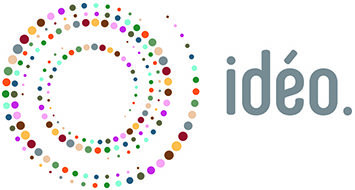ADN IDÉO, OUR METHODOLOGY
To support you and guide you towards performance, we suggest you use ADN IDÉO, the methodology we have developed. The fruit of our experience and research, this methodology is based on a virtuous and continuous dynamic of 4 key stages designed to reconnect the individual or group with itself, to guide it towards action and to lead it towards meaningful and lasting success.
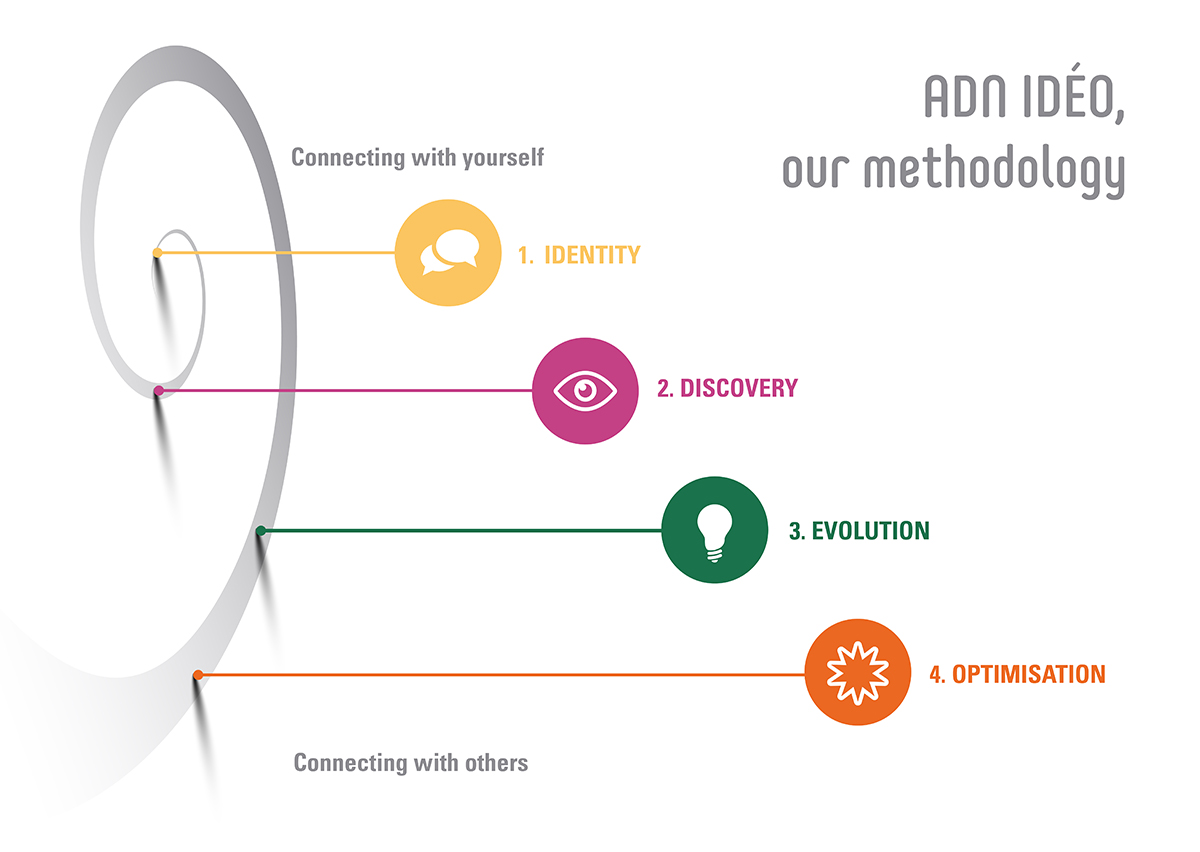
CONNECTING WITH YOURSELF
1. Identity
We take the time to meet the client and gain a detailed understanding of his or her context and needs.
Our difference: an environment and active listening that create the conditions for trust.
2. Discovery
Discovering the client’s talents and ideals, connecting with their deepest aspirations.
Our difference: a focus on what is positive, what has already worked, what is authentic, intrinsic and meaningful.
CONNECTING WITH OTHERS
3.Evolution
Drawing up an action plan with the client to get things moving.
Our difference: pragmatic support to turn dreams into reality.
4. Optimisation
Debriefing with the customer and establishing a long-term relationship.
Our difference: maintaining the link and the dialogue to ensure a long-term partnership.
Our tools...
POSITIVE PSYCHOLOGY
“Positive psychology is the scientific study of optimal human functioning. It aims to discover and promote the factors that enable individuals and communities to flourish. Positive psychology represents a new commitment on the part of its psychologists and researchers to draw attention to the sources of psychological health, thus going beyond the previous focus on diseases and disorders”.
It intervenes on three levels: personal, interpersonal and group.
As for positive organisational psychology (POP), it deals with the scientific study and its applications to individual and organisational factors, which mainly enable people (but also institutions) to develop and reach an optimal level of functioning, either on a cognitive, psychological, affective, relational or performance level. POP seeks the development of people in an organisational context, with a focus on efficiency, in a win-win vision. Inspired in particular by Carl Rogers, a well-known humanist psychologist, who already developed the concept of optimal human functioning, positive psychology is primarily oriented towards the individual.
Positive psychology proposes primarily specific actions and not general processes to be followed from A to Z. Performance is only the consequence of good human functioning, but not a goal in itself.
The main themes of positive psychology include subjective and psychological well-being, positive emotions, positive relationships, individual strengths and talents, gratitude, resilience and optimism, self-determination, autonomy, the need to contribute, belong and be differentiated, flow, the appreciative approach, meaning, laugh, play, meditation, trust, forgiveness, physical balance and health, etc.
All our services, as well as the tools we have developed, are strongly influenced by scientific research from positive psychology.

APPRECIATICE INQUIRY

NONVIOLENT COMMUNICATION
NonViolent Communication is at the benefit of both the company and its employees, for the well-being but also for performance. It allows us to be aware of what we want and to communicate it through precise messages with a well-intentioned intention. NVC creates creative collaboration because it teaches us to express what is happening for us before we implode or explode, but also to hear the message of others and what is at stake behind the judgments. It is a powerful tool for resolving disputes, whether personal, professional or political.
Marshall Rosenberg, an internationally renowned man of peace, invented and developed the NVC, which can revolutionise relationships and transform society, and it has already proven itself.
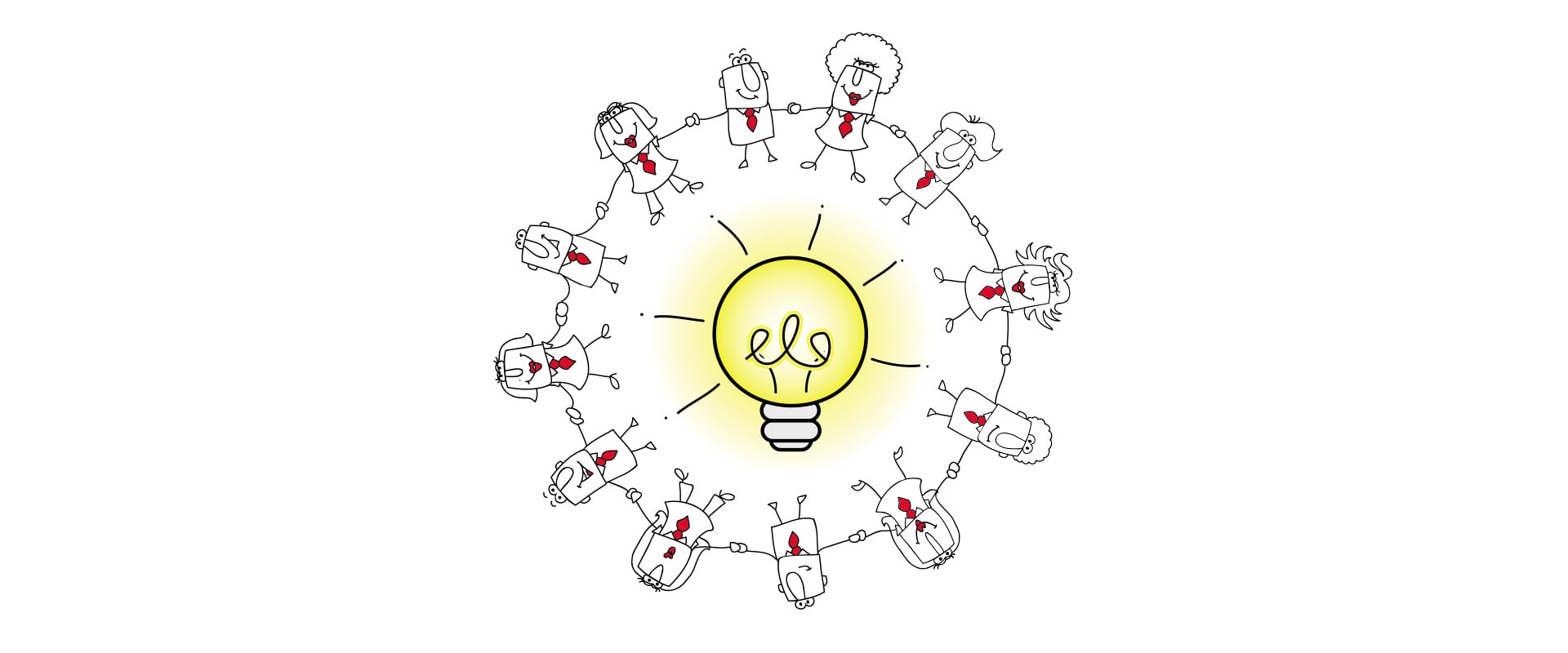
FISHBOWL
This method promotes collective intelligence and the regulation of group debates or discussions. It consists of placing five chairs in the center (place of the debate) of several concentric circles, made up of a certain number of other chairs according to the size of the audience. One person initiates a discussion on a specific topic and presents his or her point of view. Three other people then join him/her to provide their insights. A chair should always be left free to allow anyone to come and participate. When this 5th chair becomes occupied, one of the 4 other people already present must leave his or her seat. This allows the discussions to be constantly enriched by new perspectives. A person who has left the center can come back later. It is advisable to plan discussions of 30 to 45′ maximum. When this is completed, a synthesis of the discussions is made and decisions can be made. Discussions can then be reopened on another theme or issue.
We regularly work with teams according to this process.

THEATER FORUM
WHAT IS PARTICIPATORY FORUM THEATER?
It is a kind of interactive theater.
A method of socio-professional learning that allows:
4 angles of awareness
- See the situation experienced by the participants
- Analyse the deep-rooted causes of the situation, including internal and external sources of dysfunction
- Explore group solutions to these problems,
- Acting to change the situation by following the Corporate Policies and Procedures
PARTICIPATORY FORUM THEATER, WHERE DOES IT TAKE PLACE?
- The space of the company can be transformed into a company stage
- Or on a real theater stage
WHO IS PARTICIPATORY FORUM THEATER FOR?
Participatory theater creates intrinsic links demonstrated when it is experienced by the employees themselves.
It is an instrument that privileges the knowledge of oneself and of the group, because it is a social and behavioral mirror.
WHAT IS THE PURPOSE OF PARTICIPATORY FORUM THEATER?
To open minds to new possible realities by highlighting learned roles and outdated actions.
Participatory theater is an incredible accelerator where slow motion has set in, it awakens spontaneity, revives ambition and creativity.
Forum theater creates movement where there was passivity.
By playing learned and inappropriate behaviours, critical conditions, it opens up the field of the possibilities of response of an individual to closed situations that arise by proposing the vision of overcoming.
It allows to practice with confusion and to gain precision.
PARTICIPATORY FORUM THEATER HOW DOES IT WORK?
“Theatrical” situations are created in spaces of the company, or in a theater.
Employees are taken into a scenario of their company and encouraged to propose immediate measures that may affect the current play.
Employees who have become “spect-actors” can stop the show and suggest to the actors, or interpret different actions themselves, who will then carry out the audience’s proposals.
HOW DOES PARTICIPATORY FORUM THEATER OPERATE?
The actors start with a problematic situation and suggest solutions.
For example: an employee helping a colleague in difficulty, a colleague discriminating with his pregnant colleague, a director who communicates badly, the welcome of a new employee, a conflict between two employees who nevertheless wish the same result, difficulties in the open space or simply the lack of communication between employees.
The “spect-actors” have the possibility to observe and stop the action
- Coming on stage to replace the actors
- By putting their own ideas into practice
- By suggesting different actions for the actor, who will then carry out the audience’s suggestions
A debate engages in free dialogue processes that encourage critical thinking.
The theatrical approach is experienced here as a repetition of problems, with the awareness of common action, anchored in a team reflection of mutual problems.

JOB CRAFTING
Job crafting consists in modeling one’s work in his/her image, transforming it little by little so that it corresponds to us in all aspects. The objective is to increase motivation, involvement and efficiency in daily life. After defining their activities, people analyse, through successive thoughts, their tasks, relationships and problems through the filters of emotions, forces and meaning. They then decide what they wish to keep, change and what actions to take to do so.
We accompany job crafting processes over one day.
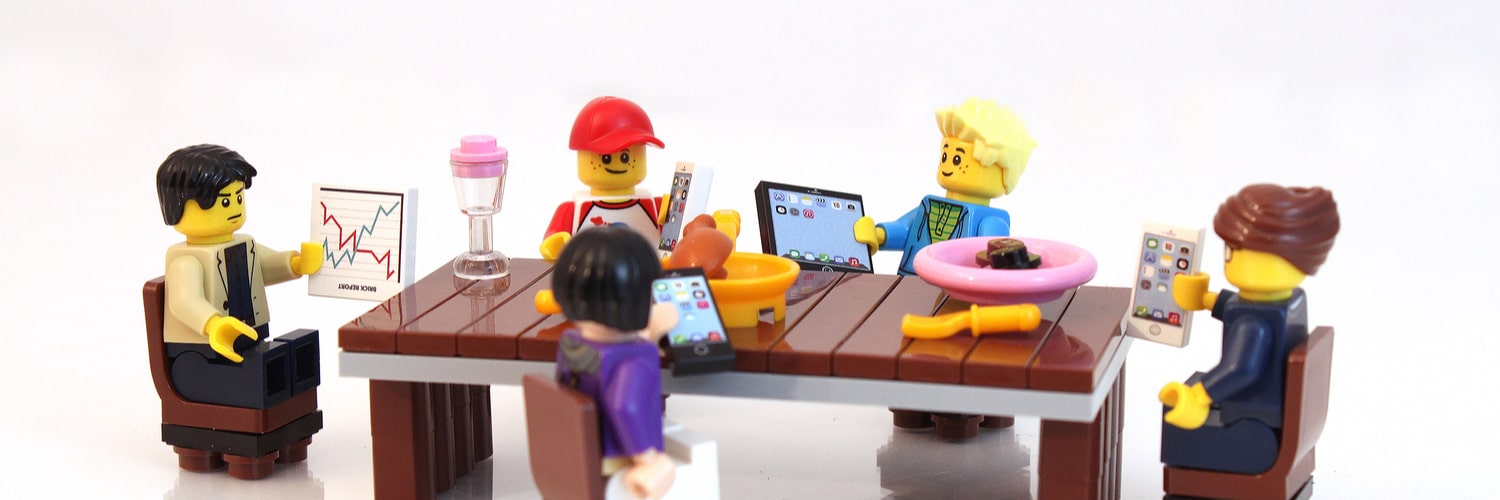
LEGO SERIOUS PLAY
Catherine Gillet and Philippe Georgy are certified in the lego serious play (LSP) method applied to positive psychology. This method was conceptualised in 1996 by the owner of lego, MIT in Boston and IMD in Lausanne, which allows to say that we are in a “serious play”, much more than a toy, and in a magnificent means of creativity. LSP is defined as a thinking, communication and problem-solving technique for groups. It is at the center of collective intelligence. It allows to “think with your hands”, to open the mind to much wider possibilities and to involve all team members equally, which is rarely the case in classical sessions. LSP is structured around 6 steps: 1. Defining the objective of the session-ask a question, 2. Answering the question with a construction, 3. Telling/sharing one’s model through metaphorical narratives, 4. Exploring and questioning models, 5. Sharing models, 6. Capturing the essential elements of the session and defining an action plan.
We use LSP in team building, change management, coaching and appreciative inquiry processes.

TALENTS ROOMS
Talent rooms positive psychology interventions (PPI), in the framework of places dedicated to specific activities (individual or collective thinking, exercises, exchanges, sharing, proposals or decision making on various themes) related to key areas of human resources and management: recruitment, integration, cohesion, personal development and training, meaning and managerial skills. They contribute to creating social bonds, allowing each individual to express themselves autonomously, to the development of talents (skills and knowledge in the broadest sense) and to fulfillment (living well at work).
We run tailor-made days according to the above-mentioned format and in relation to one of the 6 themes mentioned above. We remain at your disposal to bring you more details on this innovative and exclusive concept at IDEO.

TESTING
Motivational Reiss profile and AEC DISC
In support of its interventions in coaching, job search support, team building, conflict management or assessment, IDEO is certified to use two tools, different in what they measure, even though they may be complementary. The two tools come in the format of about thirty pages.
The Reiss Motivational Profile: developed by the American psychologist Steven Reiss, this profile is the only tool based on research on what motivates a human being. It is built around 16 intrinsic motivations and measures their intensity. It allows people to better identify the optimal context that would enable them to meet their needs and the “why” they do things (what makes them willing). Our motivational profile depends mainly on our DNA and our evolution until we are about 14 years old. Thus, it varies very little throughout our lives. Philippe Georgy was trained directly in the United States by Steven Reiss. He is the trainer and distributor in French-speaking Switzerland. Catherine Gillet is also certified for this tool.
AEC DISC: this profile measures people’s behavioral preferences and habits, i.e. their preferences on how to do things. This profile classifies individuals on a 4-color wheel (red, yellow, green and blue) according to the criteria of relations-tasks and extroversion-introversion. The rainbow method synthesises Carl Jung’s work on psychological types and William Marston’s DISC theory in conjunction with research on color-associated behaviours: The Language of Colors. It also integrates the work of Eduard Spranger on motivations (who tried to identify from behaviours), whereas the Reiss Profile evaluates them directly.
UPPINESS
Uppiness – Up your game at work
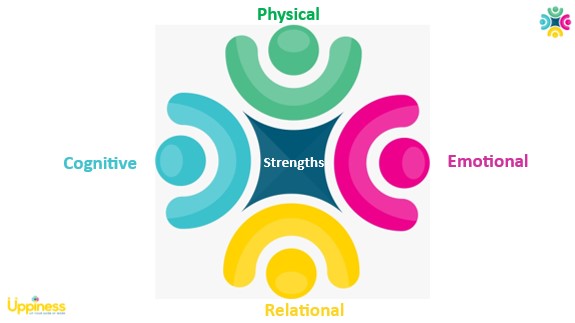
Uppiness is an innovative online game designed to help employees overcome everyday challenges using tools derived from positive psychology. We are experiencing a crisis in psychological health at work (burn-out, depression, long-term illness, stress, loss of meaning, demotivation). This costs the global economy almost 7,000 billion dollars. Uppiness offers a well-proven solution to bring smiles and energy back to the heart of teams. Positive psychology interventions and training have a remarkable return on investment of 4 to 10 Swiss francs for every franc spent. In addition, studies have shown that integrating games into learning experiences results in higher rates of knowledge retention.
Taking part to a workshop by playing Uppiness will give you a clear understanding of the five keys to happiness at work (using one’s strengths, physical and psychological balance, welcoming emotions and creating pleasant ones, harmonious and trusting relationships, the pleasure of learning, developing and using one’s potential), their importance for performance and for cultivating a happier and healthier workplace.
By playing Uppiness you will be able to solve 5 to 10 real work-related challenges in a fun and interactive way, either by starting from the most common problems or by defining them specifically according to the reality of the team. You will then be able to draw up an action plan to implement the change.
After a round of Uppiness, you will have :- Solved day-to-day work issues
- Fostered a positive corporate culture
- Improved communication within your team
- Strengthened the commitment of team members
